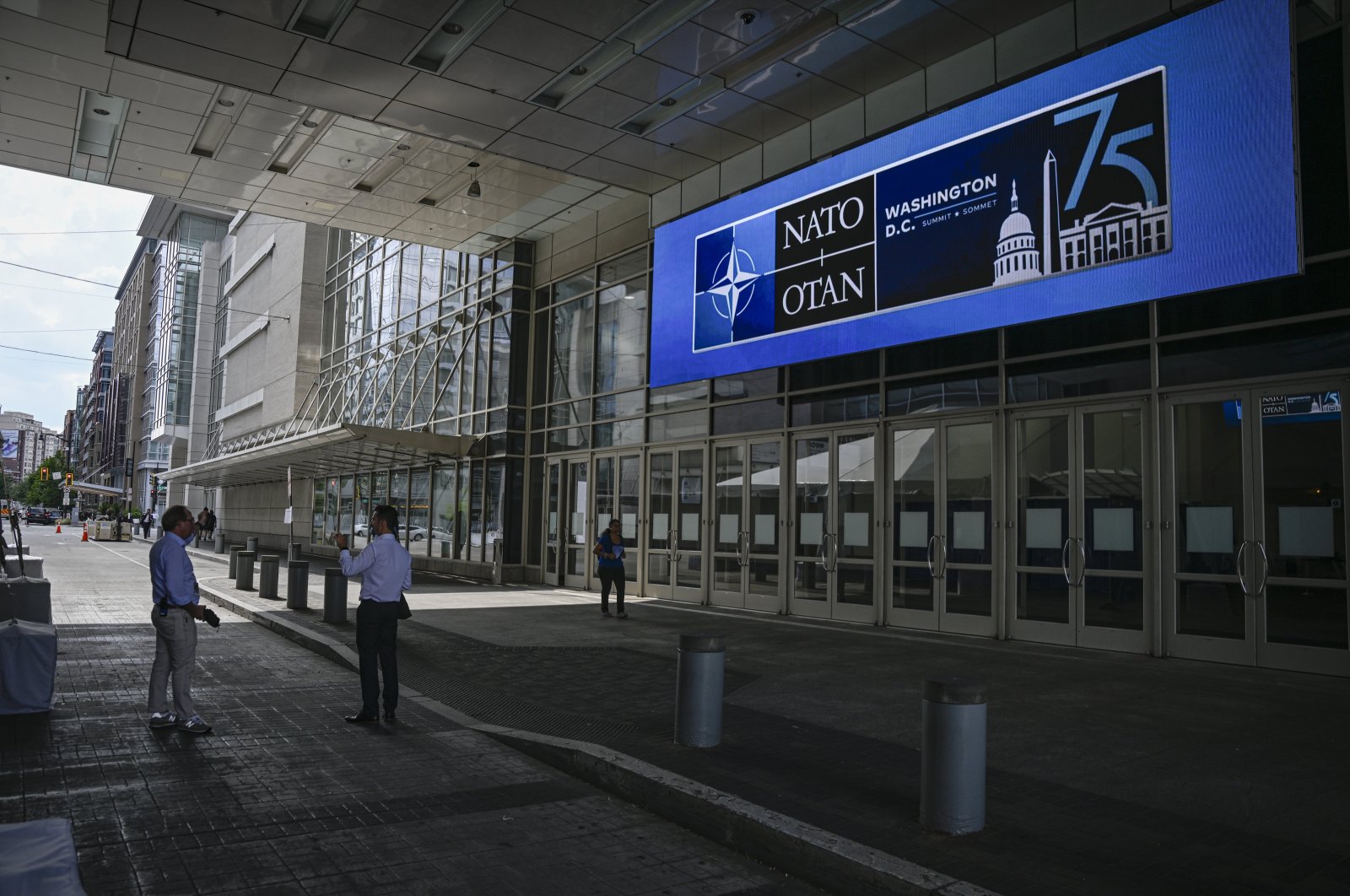
Speaking to reporters before he departed for a key NATO summit in the United States on Tuesday, President Recep Tayyip Erdoğan said they endorsed Ukraine’s integrity, but the military alliance should not be a part of the Russia-Ukraine conflict.
Erdoğan stated that they would discuss ways to reinforce NATO's deterrent power and defense and capabilities of allies at the summit. "This summit has additional importance as it is held on the 75th anniversary of NATO," he told reporters at Esenboğa Airport in the capital of Ankara. "We will follow up on decisions taken on last year's NATO summit in Vilnius. We will also hold talks with leaders of NATO partners in the Asia-Pacific region, including Australia, South Korea, Japan and New Zealand," he said.
The summit's last session will be the NATO-Ukraine Council meeting. Erdoğan stated that the world knows Türkiye's support of Ukraine's territorial integrity, sovereignty and independence. "We also adhere to our principled stance that opposes NATO to be a party to the conflict while it plans steps to support Ukraine," he said. Türkiye sought to mediate between Russia and Ukraine and even hosted a prisoner exchange between the two countries. It also brokered a grain deal amid conflict and is among few countries maintaining good ties with both countries. "We always said a fair peace would not have any loser. We took up the challenge to clear the way for a permanent peace after a cease-fire, primarily through the Istanbul process," he said, referring to a landmark process launched in 2022. "Every day where guns are fired and lives are lost shows we are on the right side on this issue," he said.
Stating that the consultations they will hold in Washington will also make significant contributions in terms of determining NATO's new vision for the alliance's southern flank, the Turkish president noted, "The cyber world, the fight against disinformation, and the challenges brought by emerging technologies will also be on our agenda."
Emphasizing that the Washington summit will once again place on the record the truth that the pivotal role in the Europe-Atlantic region's security belongs to NATO, Erdoğan said: "Türkiye is one of the top five allies contributing the most to NATO's missions and operations. We are doing more than our part in terms of burden sharing. We are one of the backbone countries of NATO with the capabilities we have developed on land, at sea and in the air. The importance we attach to the alliance in this period of diversifying threats is clear."
Regarding outgoing Dutch Prime Minister Mark Rutte's election as the NATO secretary-general, Erdoğan said: "Of course, we will also have meetings with Rutte in America. He told me that he would visit Türkiye before taking office. I believe that we will carry out our steps in the same way with Rutte, just as we carried out the process in a very sincere atmosphere with Stoltenberg."
Mark Rutte was elected NATO secretary-general on June 26. Rutte will take over as the NATO chief on Oct. 1, when current NATO Secretary-General Jens Stoltenberg's term expires after 10 years.
Erdogan said, regarding the fight against terrorism and the support Ankara receives from the alliance, "Are we in the position we want with NATO at this point? I am telling you frankly and sincerely that we are currently endeavoring to overcome these problems."
TRNC recognition
Answering a question on the participation of the Turkish Republic of Northern Cyprus (TRNC) in the Informal Summit of the Organization of Turkic States held in Azerbaijan's Shusha on July 6, the president said: "TRNC is already a full member of the Organization of Turkic States in our eyes. In this regard, their approach (members of the Organization of Turkic States), especially Azerbaijan, has almost reached the same position as ours. As it is known, the TRNC was present at the last Shusha Summit."
"We are endeavoring how we can bring the TRNC to the point of full membership," he said and underlined that Ankara was developing this with the Turkic states.
The East Mediterranean island of Cyprus has been mired in a decadeslong dispute between Greek Cypriots and Turkish Cypriots, despite a series of diplomatic efforts to achieve a comprehensive settlement. Ethnic attacks starting in the early 1960s forced Turkish Cypriots to withdraw into enclaves for their safety. In 1974, a Greek Cypriot coup aimed at Greece’s annexation of the island led to Türkiye’s military intervention as a guarantor power to protect Turkish Cypriots from persecution and violence. The TRNC was founded in 1983. It has seen an on-and-off peace process in recent years, including a failed 2017 initiative in Switzerland under the auspices of guarantor countries Türkiye, Greece and the U.K. The Greek Cypriot administration was admitted to the EU in 2004, the same year when Greek Cypriots thwarted a U.N. plan to end the longstanding dispute.
